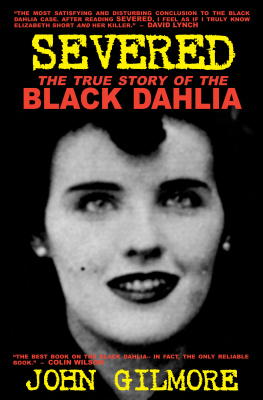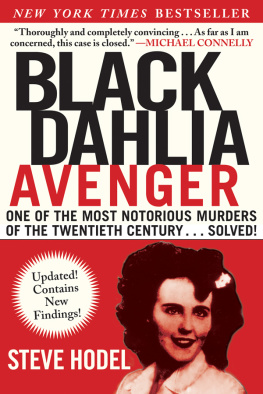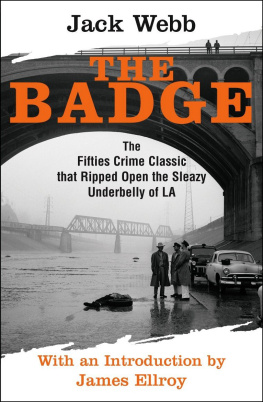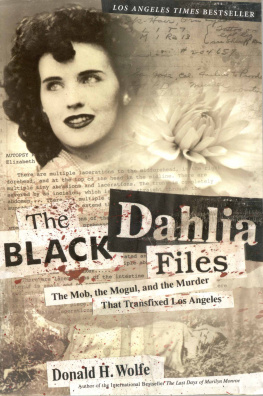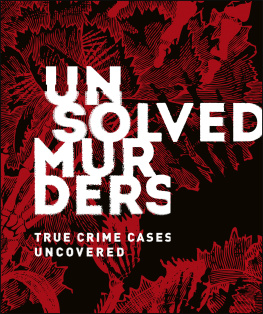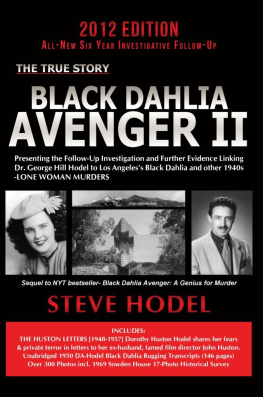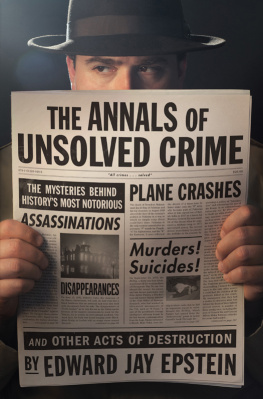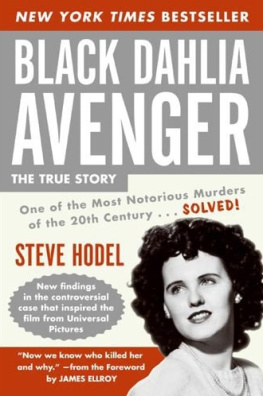Gilmore John - Severed: the true story of the Black Dahlia
Here you can read online Gilmore John - Severed: the true story of the Black Dahlia full text of the book (entire story) in english for free. Download pdf and epub, get meaning, cover and reviews about this ebook. City: California;Los Angeles;Los Angeles Calif, year: 2006, publisher: Amok Books, genre: Detective and thriller. Description of the work, (preface) as well as reviews are available. Best literature library LitArk.com created for fans of good reading and offers a wide selection of genres:
Romance novel
Science fiction
Adventure
Detective
Science
History
Home and family
Prose
Art
Politics
Computer
Non-fiction
Religion
Business
Children
Humor
Choose a favorite category and find really read worthwhile books. Enjoy immersion in the world of imagination, feel the emotions of the characters or learn something new for yourself, make an fascinating discovery.
- Book:Severed: the true story of the Black Dahlia
- Author:
- Publisher:Amok Books
- Genre:
- Year:2006
- City:California;Los Angeles;Los Angeles Calif
- Rating:4 / 5
- Favourites:Add to favourites
- Your mark:
- 80
- 1
- 2
- 3
- 4
- 5
Severed: the true story of the Black Dahlia: summary, description and annotation
We offer to read an annotation, description, summary or preface (depends on what the author of the book "Severed: the true story of the Black Dahlia" wrote himself). If you haven't found the necessary information about the book — write in the comments, we will try to find it.
Severed: the true story of the Black Dahlia — read online for free the complete book (whole text) full work
Below is the text of the book, divided by pages. System saving the place of the last page read, allows you to conveniently read the book "Severed: the true story of the Black Dahlia" online for free, without having to search again every time where you left off. Put a bookmark, and you can go to the page where you finished reading at any time.
Font size:
Interval:
Bookmark:
Described by the Sydney Morning Herald as the quintessential L.A. noir writer, John Gilmore has been acclaimed internationally for his hard-boiled true crime books, his literary fiction and Hollywood memoirs. As one of todays most controversial American writers, Gilmores following spans the globe from Hong Kong to his native Hollywood. He has traveled the road to fame in many guises: kid actor, stage and motion picture player, painter, poet, screenwriter, low-budget director and novelist. After heading the writing program at Antioch University, Gilmore taught, traveled, and lectured extensively while producing an indelible mark in crime literature with Severed: the True Story of the Black Dahlia, and L.A. Despair: A Landscape of Crimes & Bad Times. Gilmore now lives in the Hollywood hills where he is at work on a novel and another exploration into true crime.
www.johngilmore.com
A sweltering dusk in the midst of an L.A. heat wave a few days before Thanksgiving. Under a darkening, moonless night, the downtown buildings looked as flat as a movie set. I was on Main Street, going to meet the man who had known the Black Dahlia thirty-five years earlier. Id been trying to get together with him again for a long time. Although he had often phoned, suggesting we meet in a seedy hotel lobby or some other joint, half the time he never showed up.
For two years it had been touch and go whether the meeting would take place. This time when he called, he wanted to talk about the murder. He said, Ive got some urgent information.
As with any of these wild goose chases, I had no way of knowing that this man would become the closest to a shoe-in for Elizabeth Shorts killer than anyone before him, or anyone after him.
On the phone, hed said that if he wasnt in the Anchor Caf, where wed met beforea dingy narrow hole among a string of dark barsthe Filipino would know where he was. The air along Main Street was choked with exhaust as I walked past the pawnshops, tattoo parlors, and stinking doorways.
Through the Anchor window I looked at the peeling walls and greasy counter, at the yellow flypaper, black with its catch, wavering in the breeze of an electric fan. The skinny Filipino sat hunched on a stool, one eye closed as if the upper lid were sewn against the jutting-up cheekbone. He didnt know Arnold Smith. The man he knew was JackJack Arnold, he said, rasping and sucking on a cigarette. Jack Arnold was one of many aliases for the man I was hoping to meet once again.
The Filipino stared at me with his one seeing eye, then behind me, as if making sure I was alone. He smiled. Teeth were missing. He said, Jack said youd give me ten bucks. Okay, I agreed. I pulled out ten bucks. He reached for it with a skinny, twisted hand. His parched skin was stretched as tight as a drum skin against his skull. He took the ten and said Jack was at the 555 Club. I said okay, and his lips closed clam-like over the wet end of the butt.
Outside, a big bearded man, wearing a ragged black coat fastened with pins and dirty adhesive tape, was pressing his face against a brick wall. He was talking to God, jerking his arms up and down.
In 1947 the south end of the building housing Harolds 555 club had been called the Majestic Malt Shopa frequent hangout of the Black Dahlia. The 555 had the biggest neon, an orange and white and pink sputtering sprawl, except for the burnt-out sockets. The windows had been blackened from the inside with stove paint that had peeled in spots, through which the dim interior light leaked.
The barroom was cavern-like, with ceilings so high you couldnt see them in the dark. Out of this blackness emerged a maze of huge metal ducts and pipes. Plaintive musicalmost the gasps of a drowning womanfiltered from speakers mounted above the bar that ran the length of the south wall. Youre My Thrilla song from the mid-1930s, popular again during World War IIplayed scratchy and gauze-like. Pink lights illuminated the bar and its rows upon rows of liquor bottles. Some men were bent over billiard tables and others slumped at the bar. Some laughed or talked as if in hushed tones others stared into their drinks. A few shapes could be made out in the dark corners. Light from a toilet door cast a yellow box on the concrete floor.
For maybe half an hour I sat in a booth with two bottles of beer. And then Arnold Smith limped into the bar. He was at least six-foot-four but rake thin, his gaunt body stooped in an almost S-shape, head bent at an angle. The long, unshaven face seemed pushed in from the sideshis mouth was an almost lipless slit, tightened as if by a wire at the back of his head.
The dark hair was badly cut and mussed, he wore a blue shirt and baggy pants, and the shoes were worn down at the heels. He stood just inside the doorway for a long time, and when he finally came to the booth, he didnt say anything. Just sat and stared at me as though it was an effort to raise his glance higher than shoulder line. The dark, bloodshot eyes showed nothing. It was a face made of cardboard. I was surprised hed showed up, and cautiouswary that Id make a wrong move and send him limping back into the shadows.
I slid the beer across the table. Only then did I notice the rumpled brown bag held against his side, about a foot long and as wide as a cigar box. He kept it pressed to his side as he drank the beer. He looked like a corpse.
Like I said to your ex-wife, he said, I saw you on television about that Hinckley kid taking a shot at the President.
That was a while back, I said.
Didnt exactly hit the fuckin target, did he? Smiths dirty fingers were yellowed with nicotine. Got that fat guy. Is he deadthat fat guy?
No, I said. As far as I know, hes still alive. Attempted assassinations are a little rough going.
His mouth moved to laugha slight smirk or just a reflex before he stuck a cigarette between his lips. Even as he struck a match, he kept his right wrist leaning against the package. He asked if Id been paid to talk about Hinckley on television. No, I said. It was the news.
You got any money? he asked. He poured beer into a glass, spilling foam on the table. He wiped at it with his cuff. His head bent back a little as he raised the glass and drank, but the eyes were lowered toward me. I nodded. I had some money. He lowered the glass and set the package on the table.
Theres a picture I want you to see, he said, unfolding the sack and reaching into it. He brought out an old Sees candy box wrapped with rotten rubber bands. One snapped, shredding, as he tugged them off. Get us a couple of shots, he said. He wanted whiskey, and more beer to chase it.
When I got back from the bar, he had lifted the lid off the candy box, which was placed on the seat next to him. Inside were old photographs, folded papers, cut-out newspaper articles, and some black material I couldnt make out in the dimness.
Like a flashlight beam, Elizabeth Shorts face seemed to shine straight out of the photograph he took from the box. There she wasthe Black Dahlia. She seemed to be the only one in the group shot whose face was directly in line with the lens.
I reached for the picture, but he said, Ill show it to you. He held it by the edges; he didnt want me to handle it or see the back of the photo. The black-and-white emulsion was lined and cracked as though it had once been carried in a wallet. I put my beer down and leaned forward. Where was it taken? I asked.
Right here, he said. He meant the room we were in. With a kind of smile, he said, Just about where youre sitting, and, turning his head, stared at the floor. I followed his gaze, thinking hed dropped something. He said there was a line on the floor where a wall had been removed. See, he said, the wall in this picture used to be right here. Thats the canthe toilet in the bar. Now it doesnt have that sign and that light on it. Maybe 53after the Korean Wars when they took out the wall and made it one joint instead of two. He gazed up and said, A couple years ago they took out the ceiling thatd been in here since back before Pearl Harbor. You cant see up there in this goddamn light, but were sitting right about the same place this picture was taken.
Font size:
Interval:
Bookmark:
Similar books «Severed: the true story of the Black Dahlia»
Look at similar books to Severed: the true story of the Black Dahlia. We have selected literature similar in name and meaning in the hope of providing readers with more options to find new, interesting, not yet read works.
Discussion, reviews of the book Severed: the true story of the Black Dahlia and just readers' own opinions. Leave your comments, write what you think about the work, its meaning or the main characters. Specify what exactly you liked and what you didn't like, and why you think so.

